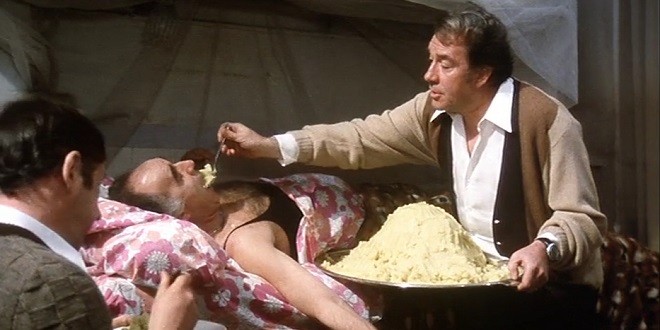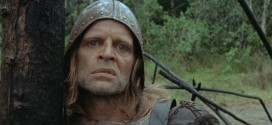Spoiler Scale (How spoilery is this article on a scale of 1 to 10?): 7
One common cop-out to avoid any serious philosophical discussion of the seven deadly sins is to bring up the e-word – excess – as in, “well, these behaviors are only ‘sins’ if committed in excess.” But sometimes it takes only one act of lust, greed, or pride to wreak havoc on oneself and others, and except in the most hyper-definitional sense, excess may be considered its own distinct sin. That said, in contemporary society, “gluttony” may have the most difficulty in maintaining its “deadly” status. For many, the word (from the Latin, to gulp down or swallow) is specifically linked to overeating, although over the last two centuries, we have come up with so many new ways to overindulge – to pleasure ourselves into the same dead end. And with the ascendance of the fields of biology and psychology over that same period, a new approach and nomenclature has emerged – one that threatens the idea of excessive consumption as a moral failing and reduces it, in many instances, to that of a genetic malady. In its current manifestation, the concept of addiction applies not just to food, alcohol, and drugs, but to behaviors such as sexual gratification, social networking, gaming, and even exercise. But even as broadly defined, perhaps gluttony is a sin best viewed not at its individual extremes (e.g., Shame (2011)), but in terms of the “soft addiction” that is said to affect an estimated 90% of a population. As a group, we super-size most everything that tastes good, smells good, looks good, sounds good, or feels good. Why have less when we can have more than ever?
As such, perhaps the most appropriate way to artistically expose (if not examine) this sin is through satire, and co-writer/director Marco Ferreri’s Le Grande Bouffe (1973) is about as stinging an indictment of this aspect of our society as any in cinema. Although four decades have passed since Ferreri earned the FIPRESCI Award from critics at the Cannes Film Festival, this darkly irreverent film may be even more topical than ever.
In the prologue, we are introduced to four middle-aged French men – all from different backgrounds and all bearing the same names as the actor who play them. Ugo (Tognazzi) is a pastry chef emasculated by his wife; Marcello (Mastrioanni) is a suave pilot who suffers from male orgasmic disorder; Michel (Piccoli) is a television producer whose sexuality is not entirely clear (even to himself); and Philippe (Noiret) is a judge in a state of arrested development, still sleeping in a child’s bed, and as we later learn, living with his childhood nanny. Without disclosing their true whereabouts to any other persons, they all convene upon a mansion belonging to Philippe’s family. Large amounts of food – including whole carcasses of animals – begin to arrive in delivery trucks, as this prophetic scene plays out.
And so the feast begins, with each man taking turns in the kitchen to keep a steady pace of dishes going. The narrative of Le Grande Bouffe proves to be both literal and allegorical, but the key to film’s satirical content lies in its compression. What many of us do to ourselves knowingly, albeit over the course of a decade or two, Ferreri’s characters do according to a prearranged plan in just a few days. By the second act, we learn that the plan is suicide, and the method is eating.
Obviously, our culture exhibits a schizophrenic attitude toward gluttony. One minute, we are bombarded with images of food, advertisements for restaurants or the latest sweet or fatty snack, with recipes and cooking tips. A minute later, we’re reminded that eating is tantamount to suicide, that indulgence and enjoyment equals social isolation and self-destruction. And someone is making money from both sides of our ambivalence about, and fascination with, food, diet, gluttony, and starvation.
– Francine Prose, Gluttony (Oxford University Press 2003)
At the outset, the visuals of the cuisine are almost enough to draw in any food porn addict; but very shortly, the celebratory vibe begins to blacken (like the candles on the dining table) as the communal indulgences begin to stray outside the culinary. Indeed, the first dinner is shared in the dark against projected slides of vintage nudies. By the next day, Marcello convinces the rest that they need a feminine presence, so they hire three prostitutes to join them, although the hired help manage to last only a day or two. Ironically, it is a buxom schoolteacher, Andréa (Ferréol), visiting with a touring class of children to view the garden of the mansion where a famous French poet once wrote, who proves to be the most willing to join the feast and service each of the men (in more ways than one). Food is mixed with sex. And then flatulence is mixed with sex. And throughout the excessively lengthy second hour of the film, as more and more dogs gather outside the mansion, the continuous ingesting takes a heavier and heavier toll. Even the toilet explodes. But the dark humor never quite masks the fundamental ugliness of their endeavor.
Beyond the food, however, each of the men either have, or develop, a distinct obsession – for Ugo, it is a set of knives; for Michel, it is a melody from a record played at various times in the film; for Marcello, it is an old Bugatti parked in the mansion’s garage; and for Philippe, it is a picture of himself suckling his mother’s breast. And with respect to at least three of them, that obsession is somehow linked to each man’s fate.
Why do we become so fixated? How do we lose balance to the point where those fixations generated in the id start to crowd out the time and inclination to pursue relationships, creative endeavors, or anything else that really makes life worth living? Perhaps, the answer lies in our suppressed nature as hunters and gatherers who now have too much time on our hands, with too many anxieties generated from within fueling that need to anesthetize ourselves. Whatever the reason, gluttony may currently be the deadliest sin of all, both physically and psychically.
Grade: B-






